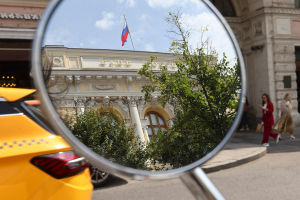Conservation of Employment: What Is in Store for the Russian Labour Market
As a result of the economic sanctions imposed on Russia, which have practically blocked access to many advanced technologies, the Russian labour market, like the economy as a whole, will also become more isolated and less developed. That is the opinion shared with Econs by Rostislav Kapeliushnikov, Corresponding Member of the Russian Academy of Sciences, Chief Researcher at the Institute of World Economy and International Relations (IMEMO), Deputy Director of the Centre for Labour Market Studies at HSE University.
Crisis of the educated
Irrespective of the extent of the continuing economic recession, the Russian labour market will undergo a considerable transformation, similar in nature to the period of the collapse of the USSR, when the planned economy came to an end and virtually all economic ties were destroyed. Today, the economy is facing a similar kind of shock because of the disruption of production and technological ties with the outside world by sanctions. However, Kapeliushnikov expects that, in contrast with the 1990s, the scale of the shocks will be smaller now.
The most notable event in the labour market in the past two months has been the suspension of operations of foreign companies in Russia, with many of them announcing decisions to leave the market. This niche was densely populated by the most qualified and educated members of the labour force, and the current crisis will hit this group of workers the hardest. However, the impact on overall employment will be less significant, because fewer than 4% of workers are employed by foreign companies and joint ventures. Moreover, many foreign companies have not yet made their final decisions.
Many skilled workers will have to look for new jobs, retrain, or go abroad (the most mobile part of the workforce has already opted to do so). However, Kapeliushnikov notes that this group should not be expected to remain unemployed for long, due to their high skill level and consequent adaptive potential. If foreign companies decide to wind up their activities in Russia – and not all of the companies which have suspended their operations will eventually leave the Russian market, some will remain here – Russian businesses will be able to fill the vacated niches. In this case, the reduction of old jobs will be offset, though only partially, by the creation of new ones.
Crisis of technology-intensive companies
The disruption of the international ties of Russian companies using imported components and technology will deal a much more serious blow to the labour market: companies will have to replace unavailable components, which will halt their production processes. Such companies are unlikely to close forever, but they will need time to find replacements for their previous suppliers, either in the domestic market or in countries that have not imposed sanctions.
The current situation is totally different from a classic crisis, in which the previous production models become unprofitable for commercial entities and force them to revise their strategies and reduce output and workforce. It is now absolutely impossible for companies to operate as before, and they need to restructure their supply chains and build new logistics. This is exactly the situation experienced by large and medium-sized businesses, which make up the core of the Russian economy, because their operations were based on Western technologies and components. The shock will be stronger for businesses which were more deeply integrated into the international economic environment: the biggest problems will arise where the added value was highest. Still, the need to change will affect everyone, without exception, continues Kapeliushnikov.
At the time the sanctions were introduced, companies had stocks of components and raw materials, and once these are depleted, the economy will encounter a new round of problems. During the readjustment of supply chains, many companies will have to pause their production or significantly reduce it. This will in turn affect the labour market. It is difficult to estimate the degree of this effect. Some employees will probably be furloughed or have to work part-time. Some companies will probably reduce wages (at least, in real terms), while others will be forced to optimise the utilisation of their workforce and, if not resorting to layoffs, at least freezing future hiring.
However, a surge in bankruptcies and a drastic drop in production should not be expected, as active adaptation will begin simultaneously via two channels: first, via import substitution, and second, via attempts to replace partners from the West with new partners from the East. Kapeliushnikov expects that, in terms of technology-intensive aspects of production, businesses will have to put up with equipment of lower quality, simplified processes, and generally more primitive production. From this point of view, the Russian economy may be thrown back 10–15 years.
Over many years, the Russian labour market has worked out ways to adapt to shocks and avoid job cuts and explosive growth in unemployment: in rough periods, adaptation is achieved by reducing working hours and lowering wages. Kapeliushnikov believes that the same can be expected in the current situation.
With double-digit inflation expected, the decline in labour costs is likely to be considerable: it will be enough simply not to index nominal wages for actual labour costs to fall by the 20–30% brought about by inflation. In this situation, employers have far less incentive to lay off their staff, which will be conducive to the conservation of employment. The government is likely to remain committed to helping large companies retain their workforces through employment subsidies, and such measures are foreseen and are being discussed by the government. It is therefore unlikely that mass unemployment will grow.
The forced and painful readjustment of economic ties will inevitably be accompanied by the reallocation of employment: from the sector of foreign companies and joint ventures to the sector of domestic enterprises and from enterprises which are unable to respond to the shocks to enterprises which are able to benefit from the new opportunities that emerge following the exit of Western businesses from the Russian market and the loss of Western goods and services. A similar transformation occurred in the Russian labour market in the 1990s, but at that time its scale was much greater: first, there were no market institutions, whereas now they are in place; second, intra-economic links were disrupted at that time, whereas today, only part of foreign economic ties are disrupted.
However, if during the transformational crisis of the 1990s the redistribution of the labour force was aimed at modernisation, the elimination of structural distortions, and the achievement of higher efficiency, economic activity will become more primitive and archaic as a result of the current crisis: due to the disruption of ties with the global market, the Russian economy, in many instances, will have to return to older, less advanced, and less efficient technologies and management methods. Kapeliushnikov concludes that the formal share of highly qualified workers may not contract, but in the new conditions, a significant number of them will have to do work that does not correspond to their level of qualification. The ultimate result of this ‘reverse’ adaptation is likely to be large-scale underutilisation of the human capital accrued in the Russian economy.







